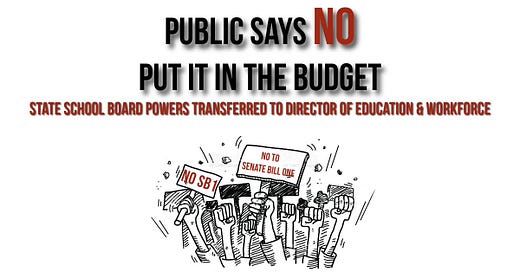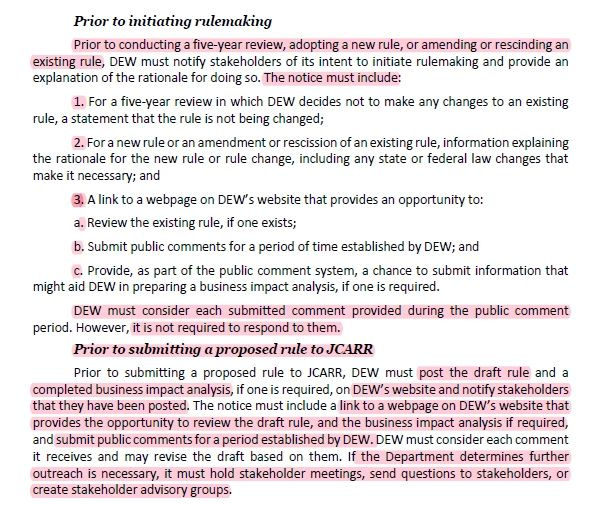BIG CHANGES :Ohio Department of Education Overhauled!
Department of Education and Workforce for now...
Original Post: July 18th, 2023
Senate Bill One restructuring the Ohio Department of Education and renaming it the Department of Education & Workforce (DEW) has passed in the Budget Bill. Why pass this legislation in the budget? I believe because it received push back from the public, so a good way to ensure the bill passes while sneaking it under the radar is to throw it in the budget bill. Neat trick by our General Assembly, right?
State Boards New Duties
Senate Bill One takes away our public representation by making the State Board a licensure and gives their power to a DEW Director whom is chosen by our Governor and appointed by the Senate. Our State School Board members duties & responsibilities now are limited to:
Educator Licensure & Licensee Disciplinary Actions
School district territory transfer determinations.
The teacher and school counselor evaluation system
Annual teacher recognition program
Educator Standards Board
The DEW Director is a non voting ex-officio member of Educator Standards Board and its committees. Senate Bill One requires the State Board of Education to make recommendations regarding Primary & Secondary Education priorities and allows for the State Superintendent to serve as an advisor to the DEW Director.
The State Board of Educations operating expenses will be paid via the State Board of Education Licensure Fund, prior law limited using the fund solely for the issuance and renewal of licenses, certificates, and permits.
DEW Directors Duties
The new Department of Education & Workforce (DEW) Director is to be appointed my the Governor and by the consent of the Ohio Senate. The Director is responsible to oversee the Department of Education and Workforce and the Primary and Secondary education in Ohio. Examples of the Director new duties:
The Director is Responsible for hiring two Deputy Directors for the two subdivisions created under this bill with the advice and consent of the Senate. The two subdivisions are The Division of Primary and Secondary Education and the Division of Career-Technical Education. The duties of the Deputy Directors is not outlined in the bill and is the responsibility of the Director to delegate duties to the Deputy Directors.
Directors Rule Making Authority
The DEW Director is to adopt all administrative rules per prescribed powers and duties outlined by the General Assembly and prohibits the Director to adopt rules regarding the State Board or State Superintendents retained powers. The General Assembly may also adopt a concurrent resolution to rescind any administrative rule adopted by the Director of Education and Workforce.
The bill requires DEW to establish a stakeholder outreach process when engaging in the rule making process which includes a notice and opportunity for stakeholder feedback prior to submitting rule to the Joint Committee on Agency Rule Review (JCARR). This outreach can include meetings, questionnaires, or stakeholder advisory groups.
The rules regarding the DEW Director making rules and submitting proposed rule to JCARR can be seen in the image below.
The bill goes on to state…
"That a notice under the process is a not a PUBLIC notice, but rather it is a COURTESY for stakeholders. DEW also is not required to send draft rules out to, nor negotiate draft rule language with, stakeholders".
To me it sounds like this entire process is then optional, however, a public presentation requirement is established in the bill. It states the Director of Education and Workforce or designee must hold a public meeting at least every other month. A presentation is required that goes over:
New Initiatives, Guidelines, or Policies
Changes to State and Federal laws that affect DEW or stakeholders.
Rules the Director intends to adopt, amend, or rescind.
A time for public discussion must be made available after presentation, this presentation must be recorded and uploaded to the internet within five days after the initial meeting. If a nonemergency rule was adopted and not presented at public meeting it is then null and void.
Senate Bill One goes on to state that any policy adopted or guidance that is issued by the Director of Education and Workforce that is not specifically outlined in federal or state law is merely advisory and is nonbinding on schools and educators and cannot be enforced as law.
Workforce Development
Under the bill it is required that DEW make information regarding career opportunities available to 7th & 8th graders and students are given information about Career Technical Education and how it can be used to earn high school credits for graduation.
The Governor’s Executive Workforce Board, the Department of Job and Family Services and higher education institutions currently produce an in demand jobs list, the Department of Education and Workforce (DEW) is now required to help create the in demand job list in partnership with these agencies. All agencies including the Department of Education and Workforce is to create and publish an OhioMeansJobs website that includes the in-demand jobs list under new legislation.
The Deputy Directors of the Division of Primary and Secondary Education and the Division of Career-Technical Education are to be appointed to the Executive Workforce Board.
Non Chartered- Non Public Schools & Homeschooling Changes
The bill codifies the Administrative Rules for Non Chartered Non Public Schools, it prohibits the Department of Education and Workforce from adopting any new rules regarding non chartered non public schools.
A child receiving home education is now exempt from the compulsory school attendance law who is receiving a home education in the subject areas of English language arts, math, science, history, government, and social studies. The law regarding exemptions for the purposes of home education is not subject to any rules adopted by the Department of Education and Workforce or the Director of Education and Workforce requiring the Director to rescind any rules regarding the issuance of excuses from compulsory attendance for the purposes of home education.
The bill defines “home education” as:
"The education of a child between 6 and 18 years old that is directed by the child’s parent, so long as that child is not enrolled full time in a public or chartered nonpublic school".
Conclusion
It is my belief that this bill centralizes power and concentrates the decision-making powers to a few leaders at the top of the organizational structure. This will broadly affect the implementation of important educational decisions. When a small group of people oversee all decisions while going to the same state-level meetings, committees, coalitions, and listening to the same educational think tanks increases the risk of bad decisions due to lack of opposition, lack of creativity, and lack of feedback on decisions propelling poorer decision-making.
Only time will tell if the true affect of this decision to restructure the Department of Education. The lack of involvement from our duly elected State School Board members is disheartening, feels like the publics voice was just ripped from Ohio's K-12 education decisions.
You can find my previous article No to Senate Bill One- Taking away Representation in Education here.
Stay Focused Ohio…
Author: Kathleen Beyer
Katie@meanstreetoh.com







